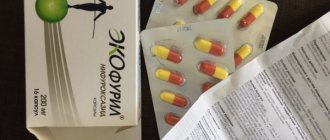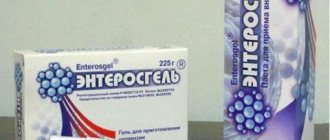Composition and effect of the drug
Levomycetin is a broad-spectrum antibiotic active against staphylococci, salmonella, streptococci, spirochetes and other pathogenic bacteria and viruses. Its active ingredient is chloramphenicol (it affects various microorganisms - pathogens of intestinal infections, dysentery, etc.). Additional components:
- Calcium stearate.
- Starch flour.
- Cellulose.
Levomycetin has antimicrobial and bacteriostatic effects. Release form: tablets and capsules. Average price: 110 rubles (10 tablets of 500 mg each).
Treatment of diarrhea with Levomycetin, how to properly treat diarrhea
Such an unpleasant symptom as diarrhea often occurs as a result of infection of the body with all kinds of pathogenic microorganisms. In this case, the use of Levomycetin is completely justified, because it is a broad-spectrum antibacterial drug, and therefore, most pathogens of infectious diseases are sensitive to it. Taking this drug gradually leads to cleansing of the body from bacteria that provoked the appearance of diarrhea, and, accordingly, the loose stool itself stops. However, we should not forget that Levomycetin is an antibiotic, therefore, it is necessary to approach such treatment with all responsibility, namely: maintain equal time intervals between doses of the drug and not stop the course of treatment unless absolutely necessary. Otherwise, pathogenic microorganisms become accustomed to the active substance of the drug and the development of a chronic form of the disease is likely.
Effect of the drug on diarrhea
The antibiotic has a bacteriostatic effect on pathogenic microorganisms, preventing their cellular synthesis. Levomycetin is absorbed into the blood within 3 hours, so the first result can be noticed after taking one tablet. And as the pathogens are eliminated, the symptoms of diarrhea gradually disappear.
At the same time, the drug is toxic and therefore can lead to negative consequences for the body (for example, it inhibits the hematopoietic function of the bone marrow, etc.).
Note! The drug disrupts the balance of beneficial intestinal microflora and, with prolonged use, causes dysbacteriosis.
Interaction with other drugs
"Levomycetin Actitab" is sold only with a doctor's prescription. Self-medication with drugs is unacceptable; it can lead to dire consequences, including death.
You should be careful when using antibiotics together with other medications. The simultaneous use of phenobarbital and chloramphenicol slows down the elimination of the antibiotic. You should not combine chloramphenicol and drugs such as erythromycin - the effectiveness of action is significantly reduced.
It is prohibited to use it together with alcohol-containing drugs, be it an alcoholic drink or a medicine based on ethyl alcohol. A common result of this combination is severe headaches, red skin, cramps and painful sensations in the epigastrium. Taking antibiotics and alcohol together leads to pressure drops, shortness of breath, and increased heart rate.
For every negative review about Levomycetin Actitab, there are a dozen positive ones - a sufficient indicator of the fact that the medicine is effective in treating mild intestinal disorders if you carefully follow the recommendations. A single use of the drug is enough to “strengthen” the intestines. Along with the elimination of diarrhea, people note a significant decrease in pain in the stomach and a decrease in discomfort in the abdomen. Many doctors and pharmacists recommend purchasing this medicine for your home medicine cabinet. This advice is especially relevant for the warm season, at the height of the season of vegetables, berries, and fruits. These fruits can cause diarrhea, especially when it is not possible to wash them thoroughly, because in summer pathogenic bacteria and microbes develop faster.
The use of Levomycetin Actitab is only possible to eliminate uncomplicated diarrhea. If a day of use does not bring improvement, it is recommended to consult a doctor to find out the reasons that caused the intestinal dysfunction. More detailed diagnostics and the prescription of other medications will likely be required. It is important to drink more fluids to avoid dehydration.
Before using any medicine, you must consult with your doctor and carefully study the instructions for use!
How to use, dosage, duration of therapy
Levomycetin is recommended to be taken when liquid stool contains traces of blood or purulent mucus, as well as with general weakness and increased body temperature. But to achieve maximum effectiveness, the drug must be taken in the first hours after the onset of diarrhea.
So, doctors advise sticking to the following dosage:
- Take 1-2 tablets orally every 5-6 hours. The daily norm is no more than 2000 mg. For severe infections, the dosage can be increased to 4000 mg per day (but only under the supervision of a specialist).
- Tablets and capsules should be taken entirely 30 minutes before meals or 1.5-2 hours after meals.
The course of therapy is usually 1-2 weeks (depending on the cause of the disorder and the severity of symptoms). At the same time, it is important not to interrupt or abandon treatment after 2-3 days, otherwise this will cause bacteria to become accustomed to the antibiotic and it will stop working.
How to take Levomycetin for the treatment of diarrhea (diarrhea) in adults
This drug is intended to treat diarrhea and should be taken as recommended by a doctor. The tablets should be taken before meals or an hour after meals. The dosage of the drug for an adult should not exceed 2 grams of chloramphenicol per day, and this amount should be divided into 3-4 doses. An intestinal infection of high severity may be a reason to double the dosage from the permissible amount.
Levomycetin is quickly absorbed from the digestive tract into the bloodstream, where its maximum amount is observed within a couple of hours after taking the drug. The effect of using this medicine is about 4-5 hours. Levomycetin can lead to various side effects, therefore, while taking it, the patient's condition should be constantly monitored through a general blood and urine test.
Please note that treatment with this drug should not be interrupted even if all symptoms of the disease have disappeared, as this may lead to the remaining bacteria becoming resistant to chloramphenicol. And this often becomes the cause of a relapse of the disease or its transition to a chronic form.
Can it be used during pregnancy and how?
The use of antibiotics during pregnancy is of great concern. And this is not surprising, because drugs of this group have a systemic effect on the body (including affecting the fetus in the womb). What to do in the case of Levomycetin? Is it worth taking it?
According to the instructions for the drug, the use of Levomycetin during pregnancy is strictly contraindicated (in any trimester). Otherwise, negative consequences for the child are inevitable, for example:
- Pathologies of development of various systems of the child’s body (including encephalopathy - brain damage).
- Organic lesions incompatible with life.
- Intrauterine fetal death (especially when taking an antibiotic in early pregnancy).
Therefore, to preserve the life and health of the child, it is not recommended to use Levomycetin during pregnancy.
Cost of the drug Levormycetin
Demand creates supply - this is how representatives of factories producing Levomycetin explain the strong increase in prices for this drug in recent years. The more than affordable price has increased by 400-500%, which is completely incomprehensible, because on the shelves of pharmacies there is now a large selection of similar medicines, many of which are much more effective. Most likely, the majority of the population of our country buys Levomycetin out of habit, because it has been used for decades and has proven itself well.
Can children take it and how?
You can take Levomycetin in childhood (starting from the 1st-2nd month of life), but in order to avoid negative reactions, treatment must be coordinated with a pediatrician. Here are approximate dosages:
- For children under 3 years of age, it is recommended to take the antibiotic 15 mg per 1 kg of weight 3-4 times a day (with the same time interval).
- Children over 3 years old and weighing more than 20 kg are given the drug 25 mg every 6 hours. But in case of severe poisoning and intestinal infections, the daily dose can be increased to 100 mg per day (only with the permission of the attending physician).
Advice! The usual drug has a bitter taste that is unpleasant for children, so the child may refuse to take it (because the bitterness makes the tablet difficult to swallow). In this case, instead of the traditional remedy, you can use Levomycetin Actitab - it has a neutral taste, but is not inferior in effectiveness to the standard drug.
The course of treatment is 1-2 weeks. If the symptoms of diarrhea go away faster, the dosage can be reduced slightly (under the guidance of a specialist), but therapy must be continued to the end.
Levomycetin for diarrhea (diarrhea) in children
Taking Levomycetin is allowed in childhood, however, the dosage is calculated depending on the age and weight of the small patient. For children under three years of age, the daily dose of the drug is 15 mg per kilogram of body weight. In this case, it should be divided into 3-4 doses. At the age of 3 to 8 years, the daily dosage is 200 mg, and for children over eight years old - 300 mg.
It should be noted that Levomycetin has a rather unpleasant, bitter taste, so taking it in childhood can be difficult. In this case, it is recommended to purchase Levomycetin-actitab, which is completely tasteless, which does not in any way affect its effectiveness.
The admissibility of treating diarrhea with Levomycetin, especially in childhood, is currently causing a lot of controversy. Most experts agree that it should be used only in exceptional cases, when nothing else is available. In this case, you should be prepared for side effects, for example, nausea, vomiting, stool upset, a sharp decrease in blood pressure, general weakness and microflora disturbances in the future. Levomycetin is not a harmless drug, so its use should be carried out exclusively under the supervision of a specialist. The lack of treatment results should be the reason for the child’s immediate hospitalization in an infectious diseases hospital, where he will undergo all the necessary diagnostic procedures, which will allow him to develop a different, more effective course of therapy.
Contraindications
Like any antibacterial agent, Levomycetin has a number of contraindications. Therefore, before starting therapy, it is important to carefully study the instructions or consult a doctor. Thus, the drug is prohibited in the following cases:
- If there is a fungus on the skin.
- In case of psoriasis.
- For liver and kidney diseases.
- In the case of acute porphyria (one of the genetic types of liver pathologies).
- For eczema.
- For acute infectious diseases of the upper respiratory tract.
- In case of diabetes.
- In case of individual intolerance to the components of the drug.
- During pregnancy and breastfeeding.
- During the neonatal period (up to 4 weeks of age).
- For blood diseases.
Important! Levomycetin is recommended to be taken with caution by people who have recently undergone antitumor treatment and radiation therapy. In such cases, the drug can be used only after consultation with the doctor; self-medication is unacceptable.
Contraindications and side effects
Levomycetin will not help with diarrhea for all patients. The official instructions for the drug indicate a number of contraindications:
- hypersensitivity to the main component of the drug;
- liver or kidney failure;
- skin diseases such as psoriasis, eczema;
- inhibition of bone marrow hematopoiesis;
- acute porphyria;
- deficiency of the enzyme phosphate dehydrogenase;
- period of pregnancy and lactation;
- age up to three years.
An overdose of the drug is fraught with the following manifestations:
- nausea and vomiting,
- depression,
- headache,
- dermatitis.
The risk of side effects will increase if sulfonamides and cytostatics that inhibit the process of hematopoiesis are taken together with Levomycetin.
What to do if it doesn't help?
If the remedy does not work after several doses or the patient’s condition worsens, it is necessary to consult a doctor and find out the reason. And there are 2 options:
- Or diarrhea is caused not by an infectious disease, but, for example, by pathologies of the gastrointestinal tract.
- Or for some reason (individual intolerance, insensitivity to antibiotic components, etc.) the drug is not suitable for a particular person. In this case, the doctor will select a suitable analogue and prescribe a dosage and course of treatment.
Therefore, if there are no positive changes after taking an antibiotic, you should not increase its dosage on your own and continue to take the drug as usual. This can only make the situation worse.
Instructions for use
The drug, which comes in tablet form, is taken orally. The tablet should be swallowed whole, washed down with plenty of warm water. The standard dosage of Levomycetin Actitab for adults is two hundred to two hundred and fifty milligrams, the dose per day does not exceed two grams. It is better to organize taking tablets three to four times a day before meals. In cases of nausea, it is better to postpone the use of the medicine for an hour and take it after meals. Increasing the dosage is permitted only under medical supervision and control of tests in a hospital setting.
Children over three years of age are prescribed one hundred and twenty-five milligrams. The dosage recommended for use by children is twelve and a half milligrams of the medicine every six hours or twenty-five milligrams every twelve hours. The exact dosage and duration of treatment is selected exclusively by the doctor, assessing the child’s condition, weight, and age.
Analogs
Levomycetin is a highly toxic drug with side effects. And therefore, its less aggressive analogues can be used to combat diarrhea. Here are some of them:
- Ciprofloxacin is a broad-spectrum antimicrobial drug (from the category of fluoroquinolones), active against various types of bacteria. Available in tablet form. The dosage of Ciprofloxacin depends on the severity and cause of the disease, as well as the age and weight of the person. The drug is contraindicated during pregnancy, lactation, in childhood (under 18 years), etc. The antibiotic should be taken with caution in case of cerebral atherosclerosis, mental disorders, as well as renal and liver failure. Application: 1 tablet 2-3 times a day. Course of treatment: 7-10 days. Price: 45 rubles (10 tablets of 500 mg).
- Alpha Normix is a broad-spectrum antibiotic (belongs to the rifamycin group). Release form: tablets. The drug is taken orally with a glass of water. Contraindications include diarrhea in combination with fever and the presence of blood particles in liquid masses, childhood (up to 12 years), intestinal obstruction, duodenal ulcer, fructose intolerance. Approximate dosage: 1 tablet (200 mg) every 6 hours. Course of application: 3-7 days. Price: 770 rubles (12 tablets of 200 mg each).
- Sumamed is an antibiotic from the macrolide group with a wide spectrum of antimicrobial action. Available in the form of tablets and capsules. Contraindications: dysfunction of the liver and kidneys, arrhythmia, pregnancy and breastfeeding, etc. Dosage: 1 tablet 1-2 times a day 1 hour before or 2 hours after meals. Use within 5 days. Price: 480 rubles (3 tablets of 500 mg).
Attention! Your doctor will help you choose the exact dosage and course of treatment. Uncontrolled use of certain medications without finding out the true causes of the disorder can only aggravate the situation.
Analogues for diarrhea
Due to the high risk of intoxication, the presence of side effects and contraindications, after consultation with a doctor, it is possible to replace it with an analogue of Levomycetin. Many of these drugs belong to the group of less aggressive antibiotics. For the treatment of intestinal disorders the following is used:
- Levomycetin Actitab. Improved version. It is distinguished by the absence of bitterness in taste and a wider spectrum of action.
- Vilprafen. An antibacterial agent that has virtually no effect on the intestinal microflora. Used in the treatment of diphtheria, genitourinary tract infections, scarlet fever and other infections.
- Monural. An antibiotic based on fosfomycin, suitable for getting rid of various infections.
- Tetracycline. It is successfully used in protocols for the treatment of intestinal infections, brucellosis, purulent skin lesions, and various bacterial inflammations.
- Amoxiclav, amoxicillin - antibacterial drugs based on penicillin, act on staphylococci, Brucella, Helicobacter, Shigella, streptococci, clostridia, salmonella.
- Gentamicin. A strong antibacterial agent that has a number of contraindications. Used in the treatment of chronic infections when other drugs are ineffective.
- Sumamed. A drug based on azithromycin. Many microorganisms and bacteria harmful to the gastrointestinal tract are sensitive to it.
- Rifaximin. Eliminates acute infectious diseases of the gastrointestinal tract caused by bacteria, “travelers' diarrhea”.
- Doxycycline. An antibiotic used in the treatment of a large number of diseases, gastrointestinal infections caused by staphylococci, clostridia, E. coli, and salmonella.
- Ciprofloxacin successfully fights enterococci, campylobacter, chlamydia, shigella and other bacteria.
In what cases should you consult a doctor?
The reason for contacting a doctor is prolonged persistent diarrhea with traces of blood or mucus in the stool, accompanied by severe abdominal pain, fever, nausea, vomiting and general weakness. Another reason to visit the doctor is the lack of positive results after taking medications for 1-3 days.
Levomycetin is an effective and inexpensive remedy for infectious diarrhea. But to achieve positive results, it is necessary to correctly calculate the dosage and maintain regular therapy. And, since the drug belongs to the group of antibiotics, self-medication is unacceptable (as it can cause complications). Before using the medication, you should read the instructions and do not use the product if there are any contraindications. If for some reason Levomycetin is rejected by the body and does not have a therapeutic effect, under the guidance of a specialist, the antibiotic can be replaced with one of the known analogues.
Levomycetin for children
Of course, only parents can decide which drugs to treat their child with. However, Levomycetin belongs to the group of antibiotics and to take it, you should conduct the necessary laboratory tests, as well as consult with a competent specialist. It is also worth considering the occurrence of side effects, such as urticaria, diarrhea, headache, decreased body defenses, impaired vision and hearing. In addition, only a doctor will be able to take into account all contraindications for taking this drug and prescribe the optimal dosage if necessary. Therefore, you should not self-medicate; a child’s health is not the place for experiments.
Indications
The drug is used in the event of infectious pathologies caused by microorganisms that are sensitive to chloramphenicol. This category includes various lesions of the biliary tract and urinary system.
Indications for use of Levomycetin include the following:
- Salmonellosis;
- brain abscess;
- paratyphoid;
- dysentery;
- brucellosis;
- typhoid fever;
- meningitis;
- whooping cough;
- purulent wounds;
- infectious diseases of the urinary system;
- skin infections;
- purulent peritonitis.
The use of Levomycetin helps to successfully cope with bacterial infections that are accompanied by diarrhea. Levomycetin also helps with poisoning. The drug is often called an intestinal antibiotic. Numerous reviews indicate that the medicine gives good results even after a single use.
Side effects
Instructions for use indicate the possible development of such changes in the body while taking the drug:
- hallucinations, confusion;
- thrombocytopenia – a decrease in the number of platelets in the blood, as well as leukopenia (insufficient levels of leukocytes in the blood);
- anemia – decreased hemoglobin level;
- hearing loss, vision loss;
- vomiting, dizziness;
- skin rash;
- stomatitis;
- bleeding;
- severe fatigue, deterioration in concentration and memory;
- allergic reactions.
The risk of side effects increases with the simultaneous use of cytostatics and sulfonamides, which inhibit hematopoietic functions. After stopping the drug, the above symptoms quickly disappear.
Levomycetin is prohibited from taking for prophylactic purposes











